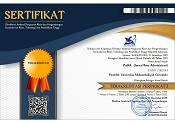Evaluation Program in Handling Cities without Slum Settlements (Kotaku) in Sukabumi City
Abstract
This study focuses on evaluating the city program policy without slums (kotaku) in Sukabumi City. In evaluation theory there are indicators to regulate the course of the program or program implementation in a good and comprehensive manner by producing programs for reducing slums in cities without slums in the city of Sukabumi. The results of the study show six indicators, namely effectiveness, efficiency, adequacy, responsiveness, and accuracy in solving the problems of the city program without slums in Sukabumi City. In implementing the city program without slums in Sukabumi City, this program policy has not been fully realized 100% considering that the overall progress of implementing activities in Sukabumi City still has slum areas remaining. Economic, social and political environmental conditions have a significant effect on the performance of the KOTAKU program. High participation can increase the effectiveness of program implementation and support strong public policy sustainability related to the KOTAKU program which is the most important factor in program implementation so that it can produce significant changes.
Keywords
Full Text:
PDFReferences
Alpiansyah. (2004). The Effectiveness of E-Government in Complaint Services in The Communication and Informatics Department (Diskominfo) in Sukabumi City, West Java Province . 1 , 1–14.
Andini, I. (2021). The Behavior and Role of the Surabaya City Government in the Improvement of Slum Areas in Tanah Kalikedinding Village, Surabaya City. Public Policy And Management , 1 (1). http://www.journal.unair.ac.id/filerPDF/6. IKE A. KMP V1 N1 Jan-April 2013.pdf
Azzahra, SA (2020). Implementation of the City Without Slums Program (Kotaku) in Sukabumi City (Citamiang District Case Study). Journal of Public Administration , 2 (2), 26–33. http://dx.doi.org/10.23969/decision.v2i2
Ervianto, WI (2019). In Urban Sustainable Urban Slums Management. Spectrant Journal , 7 (2).
Jufri, LM, Jalaludin, M., Fitri, R., Sugiyanto, & Widodo, P. (2021). Standard Operational Procedure (SOP) for Planning and Implementation of Regional Scale Infrastructure . 54.
Miles, MB, Huberman, A, M., & Saldaria, J. (2014). Qualitative Data Analysis (Third Edit, Vol. 148).
Moleong, M. Lexy J. (2017). Qualitative research methodology (revi edition). Rosdakarya youth.
Nurmandi, A. (2001). Urban Management. In A. Ulinnuha (Ed.), Kota (Vol. 18, Issue 5). PT Bumi Aksara. https://www.scribd.com/document/360443049/Manajemen-Perkotaan
Stamboel, KA (2012). Strategy to End Poverty in Indonesia . PT Gramedia Pustaka Utama.
Sugiyono. (2021). Quantitative, Qualitative, and R&D research methods / Sugiyono (Edition 3). Bandung: Alphabet.
Suhardi, HH (2018). In the slums of Makassar City .
Sulaiman, AL (2021). Collaborative Process for Handling Slums Through the City Without Slums Program (Kotaku) in Bandung City (Case Study: Tamansari Village, Bandung Wetan District). Planner Media Magazine, 2 (1), 1–23. https://mediapeplan.peplanpemdinding.or.id/index.php/mmp/article/view/10
Syamsiar, NR, Surya, B., & Tato, S. (2021). Evaluation of Slum Management. In Urban and Regional Studies Journal (Vol. 2, Issue 2). https://doi.org/10.35965/ursj.v2i2.324
William N. Dunn. (2003). Introduction to Public Policy Analysis - Translation (Second Edition). Gadjah Mada University Press. https://repo.iainbatusangkar.ac.id/xmlui/handle/123456789/10205
Zulyanti. (2017). Implementation of the Kotaku Program (City Without Slums) as a Community-Based Infrastructure Development Model in Olok Gading State Village, Teluk Betung Barat District, Bandar Lampung City. Journal of Ikom Unilam , 1–101. http://repository.radenintan.ac.id/1295/1/Skripsi_Zulyanti.pdf
Article metrics
Refbacks
- There are currently no refbacks.
Copyright (c) 2023 Publik (Jurnal Ilmu Administrasi)

This work is licensed under a Creative Commons Attribution-ShareAlike 4.0 International License.

Publik (Jurnal Ilmu Administrasi) is licensed under a Creative Commons Attribution-ShareAlike 4.0 International License.










